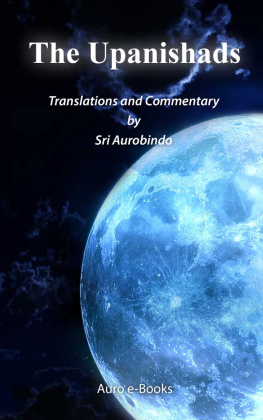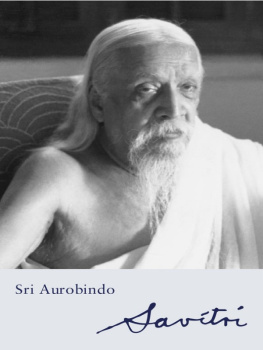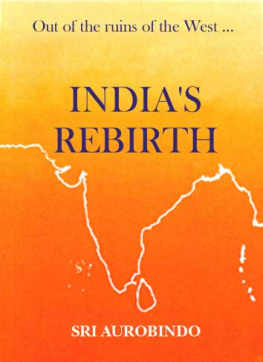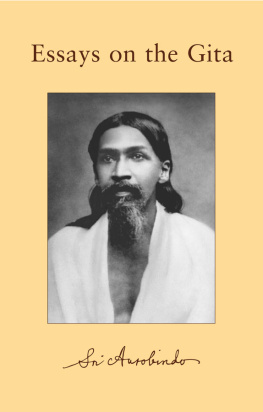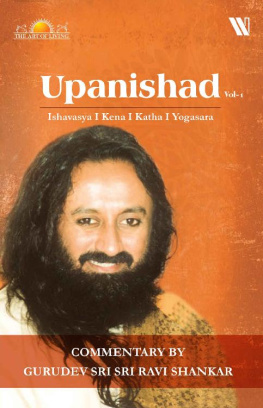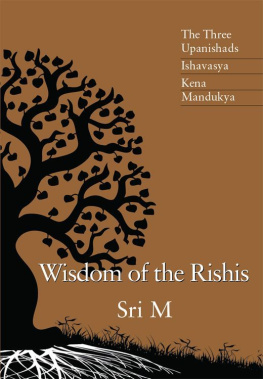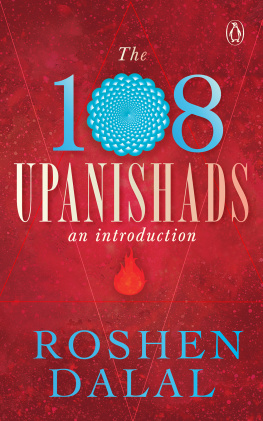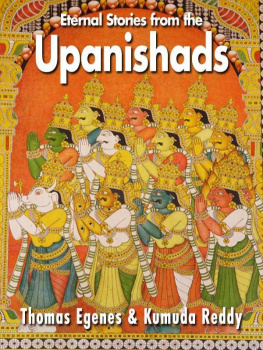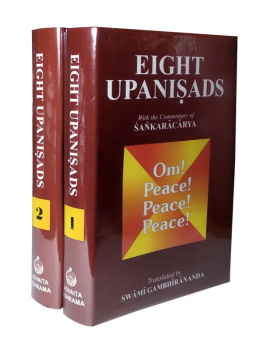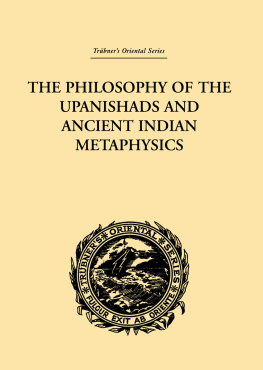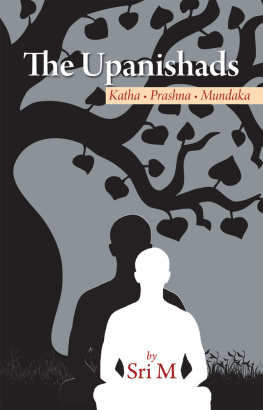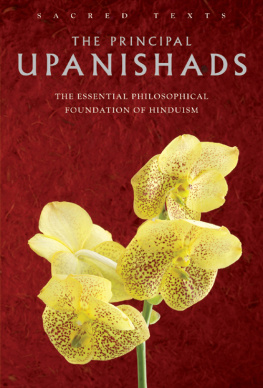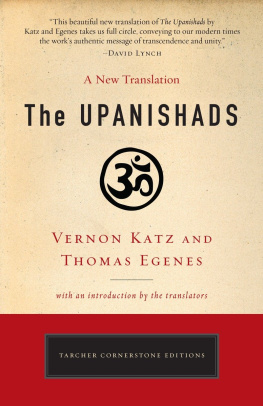Sri Aurobindo - The Upanishads
Here you can read online Sri Aurobindo - The Upanishads full text of the book (entire story) in english for free. Download pdf and epub, get meaning, cover and reviews about this ebook. year: 2014, publisher: Auro e-Books, genre: Religion. Description of the work, (preface) as well as reviews are available. Best literature library LitArk.com created for fans of good reading and offers a wide selection of genres:
Romance novel
Science fiction
Adventure
Detective
Science
History
Home and family
Prose
Art
Politics
Computer
Non-fiction
Religion
Business
Children
Humor
Choose a favorite category and find really read worthwhile books. Enjoy immersion in the world of imagination, feel the emotions of the characters or learn something new for yourself, make an fascinating discovery.
- Book:The Upanishads
- Author:
- Publisher:Auro e-Books
- Genre:
- Year:2014
- Rating:4 / 5
- Favourites:Add to favourites
- Your mark:
- 80
- 1
- 2
- 3
- 4
- 5
The Upanishads: summary, description and annotation
We offer to read an annotation, description, summary or preface (depends on what the author of the book "The Upanishads" wrote himself). If you haven't found the necessary information about the book — write in the comments, we will try to find it.
The Upanishads — read online for free the complete book (whole text) full work
Below is the text of the book, divided by pages. System saving the place of the last page read, allows you to conveniently read the book "The Upanishads" online for free, without having to search again every time where you left off. Put a bookmark, and you can go to the page where you finished reading at any time.
Font size:
Interval:
Bookmark:


Table of Contents
This e-book had been prepared by Auro e-Books , an international project dedicated to e-books on Well-Being and Spirituality.

Discover more e-books and other activities on our website:
www.auro-ebooks.com
Sri Aurobindo Ashram Trust 2010
Published by Sri Aurobindo Ashram Publication Department
Website: http://sabda.sriaurobindoashram.org
The present volume comprises Sri Aurobindos final translations of and commentaries on the Isha and Kena Upanishads, his final translations of the Mundaka and Katha Upanishads, and a commentary on part of the Taittiriya Upanishad. They are preceded by a chapter on the Upanishads from A Defence of Indian Culture. These works represent Sri Aurobindos Upanishadic interpretation in its most mature and finished form. All were written after he settled in Pondicherry in 1910. Translations and commentaries written before that year, or left incomplete by the author, have not been included in this volume. They are available in other publications.
The page numbers refer to Section One of The Upanishads, Texts, Translations and Commentaries, Second Edition, Pondicherry (1981).
T he Upanishads are the supreme work of the Indian mind, and that it should be so, that the highest self-expression of its genius, its sublimest poetry, its greatest creation of the thought and word should be not a literary or poetical masterpiece of the ordinary kind, but a large flood of spiritual revelation of this direct and profound character, is a significant fact, evidence of a unique mentality and unusual turn of spirit. The Upanishads are at once profound religious scriptures, for they are a record of the deepest spiritual experiences, documents of revelatory and intuitive philosophy of an inexhaustible light, power and largeness and, whether written in verse or cadenced prose, spiritual poems of an absolute, an unfailing inspiration inevitable in phrase, wonderful in rhythm and expression. It is the expression of a mind in which philosophy and religion and poetry are made one, because this religion does not end with a cult nor is limited to a religio-ethical aspiration, but rises to an infinite discovery of God, of Self, of our highest and whole reality of spirit and being and speaks out of an ecstasy of luminous knowledge and an ecstasy of moved and fulfilled experience, this philosophy is not an abstract intellectual speculation about Truth or a structure of the logical intelligence, but Truth seen, felt, lived, held by the inmost mind and soul in the joy of utterance of an assured discovery and possession, and this poetry is the work of the aesthetic mind lifted up beyond its ordinary field to express the wonder and beauty of the rarest spiritual self-vision and the profoundest illumined truth of self and God and universe. Here the intuitive mind and intimate psychological experience of the Vedic seers passes into a supreme culmination in which the Spirit, as is said in a phrase of the Katha Upanishad, discloses its own very body, reveals the very word of its self-expression and discovers to the mind the vibration of rhythms which repeating themselves within in the spiritual hearing seem to build up the soul and set it satisfied and complete on the heights of self-knowledge.
This character of the Upanishads needs to be insisted upon with a strong emphasis, because it is ignored by foreign translators who seek to bring out the intellectual sense without feeling the life of thought vision and the ecstasy of spiritual experience which made the ancient verses appear then and still make them to those who can enter into the element in which these utterances move, a revelation not to the intellect alone, but to the soul and the whole being, make of them in the old expressive word not intellectual thought and phrase, but sruti, spiritual audience, an inspired Scripture. The philosophical substance of the Upanishads demands at this day no farther stress of appreciation of its value; for even if the amplest acknowledgement by the greatest minds were wanting, the whole history of philosophy would be there to offer its evidence. The Upanishads have been the acknowledged source of numerous profound philosophies and religions that flowed from it in India like her great rivers from their Himalayan cradle fertilising the mind and life of the people and kept its soul alive through the long procession of the centuries, constantly returned to for light, never failing to give fresh illumination, a fountain of inexhaustible life-giving waters. Buddhism with all its developments was only a restatement, although from a new standpoint and with fresh terms of intellectual definition and reasoning, of one side of its experience and it carried it thus changed in form but hardly in substance over all Asia and westward towards Europe. The ideas of the Upanishads can be rediscovered in much of the thought of Pythagoras and Plato and form the profoundest part of Neo-platonism and Gnosticism with all their considerable consequences to the philosophical thinking of the West, and Sufism only repeats them in another religious language. The larger part of German metaphysics is little more in substance than an intellectual development of great realities more spiritually seen in this ancient teaching, and modern thought is rapidly absorbing them with a closer, more living and intense receptiveness which promises a revolution both in philosophical and in religious thinking; here they are filtering in through many indirect influences, there slowly pouring through direct and open channels. There is hardly a main philosophical idea which cannot find an authority or a seed or indication in these antique writings the speculations, according to a certain view, of thinkers who had no better past or background to their thought than a crude, barbaric, naturalistic and animistic ignorance. And even the larger generalisations of Science are constantly found to apply to the truth of physical Nature formulas already discovered by the Indian sages in their original, their largest meaning in the deeper truth of the spirit.
And yet these works are not philosophical speculations of the intellectual kind, a metaphysical analysis which labours to define notions, to select ideas and discriminate those that are true, to logicise truth or else to support the mind in its intellectual preferences by dialectical reasoning and is content to put forward an exclusive solution of existence in the light of this or that idea of the reason and see all things from that viewpoint, in that focus and determining perspective. The Upanishads could not have had so undying a vitality, exercised so unfailing an influence, produced such results or seen now their affirmations independently justified in other spheres of inquiry and by quite opposite methods, if they had been of that character. It is because these seers saw Truth rather than merely thought it, clothed it indeed with a strong body of intuitive idea and disclosing image, but a body of ideal transparency through which we look into the illimitable, because they fathomed things in the light of self-existence and saw them with the eye of the Infinite, that their words remain always alive and immortal, of an inexhaustible significance, an inevitable authenticity, a satisfying finality that is at the same time an infinite commencement of truth, to which all our lines of investigation when they go through to their end arrive again and to which humanity constantly returns in its minds and its ages of greatest vision. The Upanishads are Vedanta, a book of knowledge in a higher degree even than the Vedas, but knowledge in the profounder Indian sense of the word, Jnana. Not a mere thinking and considering by the intelligence, the pursuit and grasping of a mental form of truth by the intellectual mind, but a seeing of it with the soul and a total living in it with the power of the inner being, a spiritual seizing by a kind of identification with the object of knowledge is Jnana. And because it is only by an integral knowing of the self that this kind of direct knowledge can be made complete, it was the self that the Vedantic sages sought to know, to live in and to be one with it by identity. And through this endeavour they came easily to see that the self in us is one with the universal self of all things and that this self again is the same as God and Brahman, a transcendent Being or Existence, and they beheld, felt, lived in the inmost truth of all things in the universe and the inmost truth of mans inner and outer existence by the light of this one and unifying vision. The Upanishads are epic hymns of self-knowledge and world-knowledge and God-knowledge. The great formulations of philosophic truth with which they abound are not abstract intellectual generalisations, things that may shine and enlighten the mind, but do not live and move the soul to ascension, but are ardours as well as lights of an intuitive and revelatory illumination, reachings as well as seeings of the one Existence, the transcendent Godhead, the divine and universal Self and discoveries of his relation with things and creatures in this great cosmic manifestation. Chants of inspired knowledge, they breathe like all hymns a tone of religious aspiration and ecstasy, not of the narrowly intense kind proper to a lesser religious feeling, but raised beyond cult and special forms of devotion to the universal Ananda of the Divine which comes to us by approach to and oneness with the self-existent and universal spirit. And though mainly concerned with an inner vision and not directly with outward human action, all the highest ethics of Buddhism and later Hinduism are still emergences of the very life and significance of the truths to which they give expressive form and force, and there is something greater than any ethical precept and mental rule of virtue, the supreme ideal of a spiritual action founded on oneness with God and all living beings. Therefore even when the life of the forms of the Vedic cult had passed away, the Upanishads still remained alive and creative and could generate the great devotional religions and motive the persistent Indian idea of the Dharma.
Font size:
Interval:
Bookmark:
Similar books «The Upanishads»
Look at similar books to The Upanishads. We have selected literature similar in name and meaning in the hope of providing readers with more options to find new, interesting, not yet read works.
Discussion, reviews of the book The Upanishads and just readers' own opinions. Leave your comments, write what you think about the work, its meaning or the main characters. Specify what exactly you liked and what you didn't like, and why you think so.

